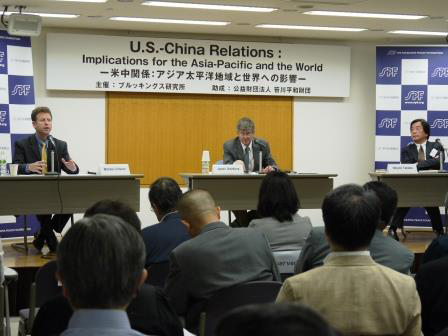On May 14, 2014, the Brookings Institution convened an event at the Nippon Foundation Building (2F) on the future of U.S.-China relations; Implications for Asia-Pacific and World, with sponsorship provided by the Sasakawa Peace Foundation. Speaking at the event on the topic of the future of U.S.-China relations and its influence on the Asia-Pacific region and the rest of the world were Dr. James Steinberg and Dr. Michael O'Hanlon, authors of 'Strategic Reassurance and Resolve: U.S.-China Relations in the Twenty-First Century' (Princeton University Press, May 2014). They were joined by Hitoshi Tanaka, Chairman of the International Institute for Strategic Studies, Japan Research Institute, acting as commentator.
(Photograph: From the left, James Steinberg, Michael O'Hanlon, Hitoshi Tanaka)
On the day of the event, Dr. Steinberg spoke about the main point of his latest publication, namely an approach of "Strategic Reassurance and Resolve." This approach, which begins with the observation that it is not easy to predict the future of U.S.-China relations, suggests that each side respects the position of the opposite side, and acts with self-control to avoid conflict. On the other hand, Dr. O'Hanlon introduced a part of the 20 proposals presented in the publication, including arrangement of the Treaty on Open Skies and, Incidents at Sea Agreement (INCSEA), cooperation in outer space, and change to the interpretation of the AirSea Battle doctrine. Professor Tanaka posed questions to the speakers, including whether the concepts of Strategic Reassurance and Resolve could take the place of the policies of 'hedging' and 'engagement', whether the U.S. and China could realistically enjoy mutual benefits, and whether the considerations on avoiding conflict between the U.S. and China that were raised in the book could be applied also to relations between Japan and China.
The above-mentioned 'Strategic Reassurance and Resolve: U.S.-China Relations in the Twenty-First Century' was produced as part of the SPF-funded project 'Containing the US-China Rivalry'.

